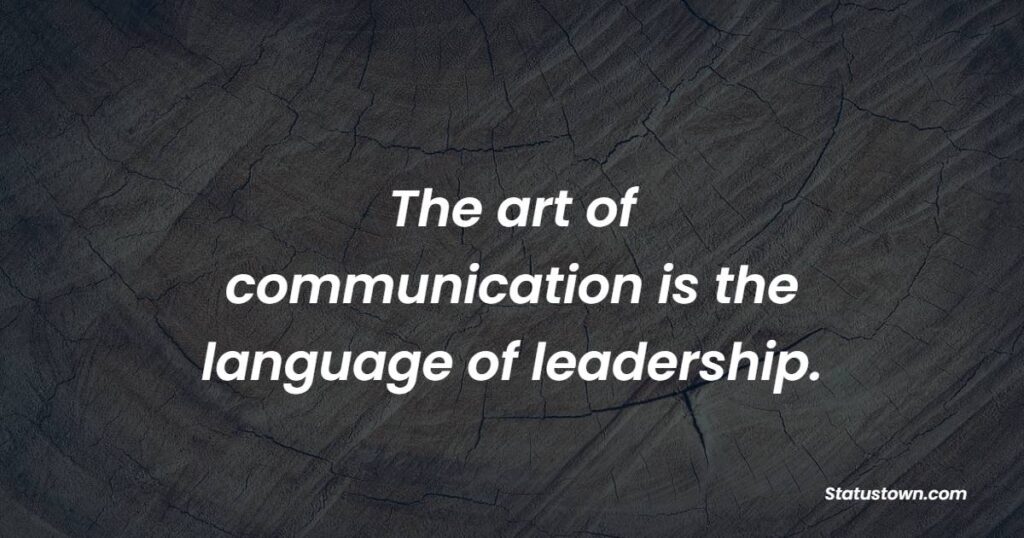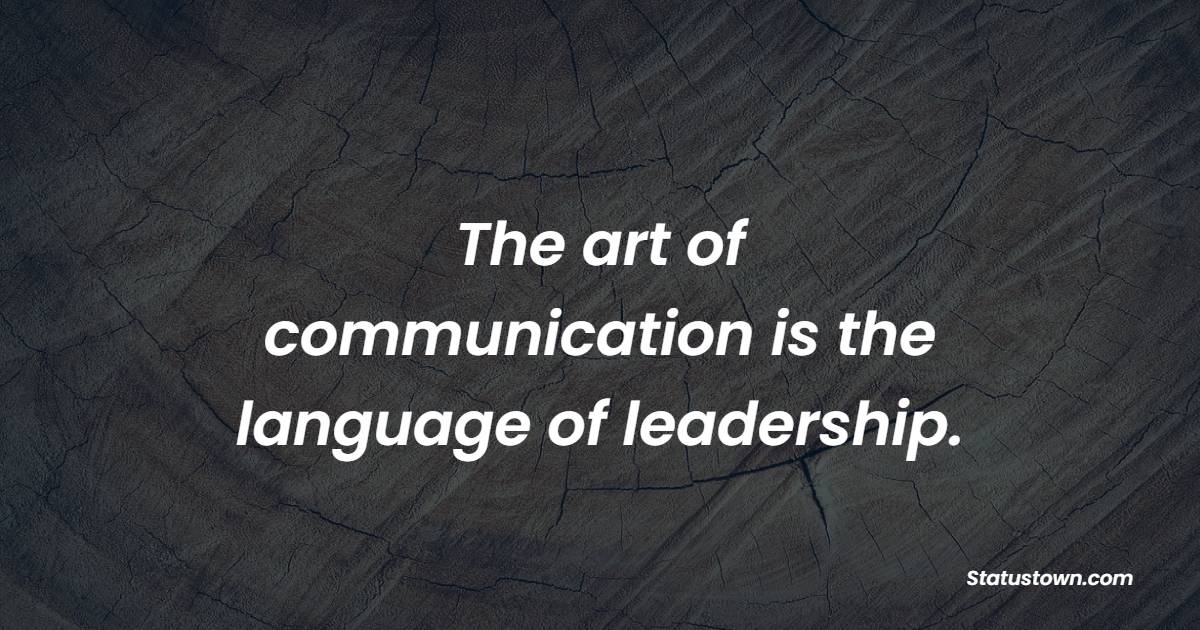
Quotes on Communication and Leadership: Inspiring Words for Effective Management
In the dynamic landscape of modern business, effective communication and leadership are not merely desirable traits; they are the cornerstones of success. The ability to articulate a vision, inspire a team, and foster a collaborative environment hinges on these two crucial skills. Throughout history, wise individuals have recognized the profound impact of communication and leadership, offering timeless wisdom in the form of quotes. This article delves into a curated collection of quotes, examining their relevance to contemporary leadership challenges and providing insights on how to apply them in practice. The power of words, the essence of leadership, and the synergy between the two are explored, offering readers a roadmap to enhance their own management styles. The importance of communication and leadership in achieving organizational goals cannot be overstated.
The Essence of Effective Communication
At the heart of every successful organization lies robust communication. It is the lifeblood that fuels collaboration, innovation, and understanding. Without clear and consistent communication, even the most brilliant strategies can falter. The following quotes capture the essence of effective communication:
- “The single biggest problem in communication is the illusion that it has taken place.” – George Bernard Shaw. This quote highlights the importance of ensuring that messages are not only sent but also received and understood.
- “Communication – the human connection – is the key to personal and career success.” – Paul J. Meyer. This emphasizes the vital role communication plays in both professional and personal spheres.
- “To effectively communicate, we must realize that we are all different in the way we perceive the world and use this understanding as a guide to our communication with others.” – Tony Robbins. Recognizing and adapting to different communication styles is crucial.
These quotes underscore the need for clarity, empathy, and active listening in all forms of communication. A leader must be a skilled communicator to convey their vision, provide constructive feedback, and build strong relationships within the team. Effective communication is the foundation upon which all leadership principles are built. The ability to communicate clearly and persuasively is a core competency for any leader aspiring to achieve organizational success.
The Pillars of Leadership
Leadership is a complex blend of vision, integrity, and the ability to inspire others. It is about influencing, motivating, and guiding a team towards a common goal. The following quotes encapsulate the core principles of effective leadership:
- “Leadership is not about titles, positions, or flowcharts. It is about one life influencing another.” – John C. Maxwell. This quote emphasizes the human aspect of leadership and the importance of building relationships.
- “Before you are a leader, success is all about growing yourself. When you become a leader, success is all about growing others.” – Jack Welch. This highlights the shift in focus from personal achievement to the development of the team.
- “The best leaders are those most interested in surrounding themselves with reliable people to give them advice and to tell them the truth.” – John Wooden. This underscores the importance of humility, trust, and seeking diverse perspectives.
These quotes highlight that leadership is not about command and control, but about empowerment and collaboration. Great leaders foster a supportive environment where team members feel valued and motivated to contribute their best. The principles of leadership are deeply intertwined with the art of communication. Leaders must master the art of conveying their vision, inspiring their teams, and providing constructive feedback.
The Intersection of Communication and Leadership
The most effective leaders are those who excel in both communication and leadership. These two skills are inseparable; one cannot truly exist without the other. The following quotes illustrate the synergy between these two vital elements:
- “Leadership is a choice, not a position. The choice is to lead, to serve, to empower.” – Simon Sinek. This quote emphasizes the active role of leadership and the importance of empowerment, which requires clear communication.
- “The most important thing in communication is to hear what isn’t being said.” – Peter Drucker. This quote stresses the importance of active listening and understanding nonverbal cues, crucial skills for leaders.
- “Good leaders must first become good listeners.” – Robert Sobel. This highlights that effective communication begins with listening and understanding the perspectives of others, a cornerstone of good leadership.
These quotes demonstrate that effective leadership requires strong communication skills. A leader must be able to articulate their vision, inspire their team, and listen to their concerns. The ability to communicate effectively is the engine that drives leadership, transforming ideas into action and fostering a culture of collaboration and trust. The interplay between communication and leadership forms the basis for strong team dynamics and organizational success. Successful leaders understand that communication isn’t just about transmitting information; it’s about building relationships, fostering trust, and creating a shared understanding. The leaders who master the ability to inspire through powerful communication are the ones who will truly thrive.
Practical Applications of Quotes in Leadership
Understanding and applying the wisdom contained within these quotes can significantly enhance one’s leadership capabilities. Here’s how to integrate these insights into daily practice:
- Active Listening: Regularly practice active listening by paying close attention to what others are saying, asking clarifying questions, and summarizing their points to ensure understanding. As Drucker’s quote suggests, listen not just to what is said, but also what is not.
- Clear and Concise Communication: Strive for clarity and conciseness in all forms of communication. Avoid jargon and complex language. Ensure that messages are tailored to the audience and their understanding.
- Empathy and Emotional Intelligence: Develop empathy by putting yourself in the shoes of your team members. Consider their perspectives, challenges, and concerns. Emotional intelligence is crucial for effective communication and leadership.
- Feedback and Constructive Criticism: Provide regular and constructive feedback. Frame criticism in a way that is helpful and supportive, focusing on behaviors rather than personal attributes. Use communication to help people grow.
- Lead by Example: Demonstrate the behaviors you expect from your team. Model effective communication, active listening, and a commitment to continuous improvement.
By incorporating these practices, leaders can create a more positive and productive work environment. The application of these principles is what truly defines the effectiveness of communication and leadership.
Overcoming Communication Challenges in Leadership
Even with the best intentions, leaders often face communication challenges. Recognizing and addressing these challenges is critical for success. Some common hurdles include:
- Lack of Clarity: Ensure that all messages are clear, concise, and easily understood. Avoid ambiguity and jargon.
- Poor Listening Skills: Actively listen to others, seek clarification, and avoid interrupting.
- Resistance to Feedback: Create a culture where feedback is welcomed and valued. Provide constructive criticism and be open to receiving feedback yourself.
- Cultural Differences: Be mindful of cultural differences in communication styles. Adapt your approach to ensure effective communication across diverse teams.
- Technological Barriers: Utilize technology effectively but also be aware of its limitations. Face-to-face communication can be more effective than email or instant messaging in certain situations.
By proactively addressing these challenges, leaders can create a more robust and efficient communication strategy. The ability to overcome these obstacles is what separates good leaders from great leaders. The importance of communication and leadership in overcoming these challenges cannot be overstated.
Conclusion: The Enduring Power of Communication and Leadership
The quotes presented in this article serve as timeless reminders of the critical importance of communication and leadership. By embracing the principles of clarity, empathy, and active listening, leaders can cultivate a more engaged, productive, and successful team. The ability to inspire, motivate, and guide others is a skill that can be honed and developed through practice and self-reflection. The effective application of these quotes can lead to a significant improvement in a leader’s ability to drive organizational success. The synergy of communication and leadership is a powerful force. As leaders continue to navigate the complexities of the modern workplace, the wisdom contained within these quotes will remain an invaluable guide. The future of leadership lies in the effective practice of communication and leadership.
[See also: The Art of Delegation for Leaders, Building High-Performing Teams, The Importance of Emotional Intelligence in Leadership]


